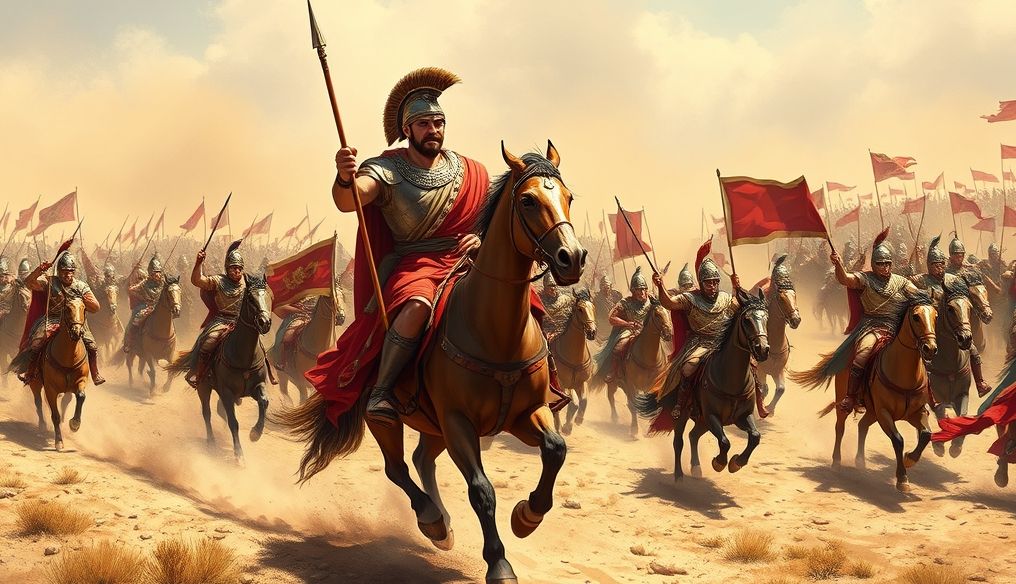Introduction: Alexander the Great - The Legend and the Leader
Alexander the Great, or Alexander of Macedon, is a pivotal figure in ancient history. He was not just a military conqueror, but an exceptional and visionary leader who contributed to changing the course of civilizations. He was born in Pella, the capital of ancient Macedonia, in 356 BC, and was educated by the philosopher Aristotle, which greatly influenced his thinking and leadership.
Alexander's Upbringing and Aristotle's Influence
Alexander received a comprehensive education in philosophy, science, arts, and politics from Aristotle. This education was not limited to theoretical aspects but also included intensive military training. Alexander learned the arts of combat, the use of weapons, and strategic planning, making him a distinguished military leader from a young age. Aristotle influenced the formation of Alexander's personality, instilling in him a love of knowledge, curiosity, and the ambition to achieve the impossible.
Early Succession and Consolidation of Power
After the death of his father, King Philip II, in 336 BC, Alexander assumed power at the age of twenty. He faced significant challenges at the beginning of his reign, as there were rebellions in various regions of Macedonia and Greece. Alexander dealt with these rebellions firmly and quickly, demonstrating his strength and leadership ability. He secured his borders, unified Greece under his rule, and prepared to embark on his major military campaigns.
The Macedonian Army: An Unstoppable Force
The Macedonian army under Alexander the Great was an unstoppable force. This army was characterized by good organization, intensive training, and innovative military tactics. The Macedonian army relied on a variety of military units, including heavy infantry (cavalry), light infantry, archers, and military engineers. Alexander paid great attention to equipping his army with the latest weapons and equipment, and training soldiers to use them effectively.
The Persian Conquest: The Beginning of the Empire
In 334 BC, Alexander began his military campaign against the Persian Empire, which was considered the largest and most powerful empire in the world at that time. Alexander achieved decisive victories in battles such as the Battle of the Granicus River, the Battle of Issus, and the Battle of Gaugamela. These victories enabled him to control vast areas of the Persian Empire, including Asia Minor, Syria, and Egypt.
Alexander's Military Strategies: Genius in Planning and Execution
Alexander the Great was distinguished by his military genius and his ability to plan and execute. He carefully studied the terrain of the areas he conquered and developed meticulous strategic plans. He used innovative military tactics, such as surprise attacks, rapid maneuvers, and exploiting weaknesses in the enemy's army. Alexander was keen to raise the morale of his soldiers and motivate them to fight with courage and determination.
- Speed and Surprise: Alexander relied on speed and surprise in his attacks, confusing the enemy and reducing their ability to resist.
- Flexibility and Adaptation: Alexander was able to adapt to changing conditions on the battlefield and change his plans as needed.
- Intelligence and Espionage: Alexander paid great attention to gathering intelligence about the enemy and using it in planning his military operations.
Expansion Eastward: Towards India and Beyond
After the fall of the Persian Empire, Alexander continued his military campaigns eastward, towards India. He achieved great victories in India and reached the Indus River. However, he was forced to stop advancing due to the exhaustion of his army and the soldiers' desire to return home. Alexander began the journey back to Babylon, where he died in 323 BC at the age of 32.
Alexander's Cultural Legacy: A Lasting Impact on the World
Alexander the Great left a lasting cultural legacy on the world. He contributed to the spread of Greek culture in vast areas of Asia and Africa, leading to the emergence of Hellenistic civilization. He founded many cities that bore his name, such as Alexandria in Egypt, which became important cultural and scientific centers. Alexander was a symbol of courage, ambition, and leadership, and continues to inspire people to this day.
Note: This article provides an overview of the life and achievements of Alexander the Great. Each of these chapters can be expanded to provide more detailed and in-depth information.




